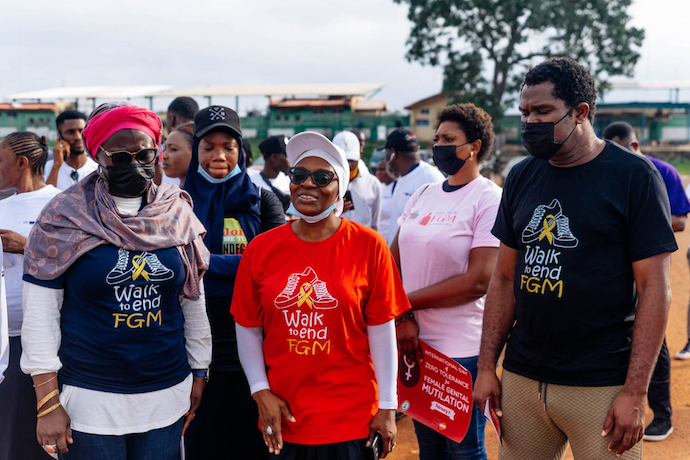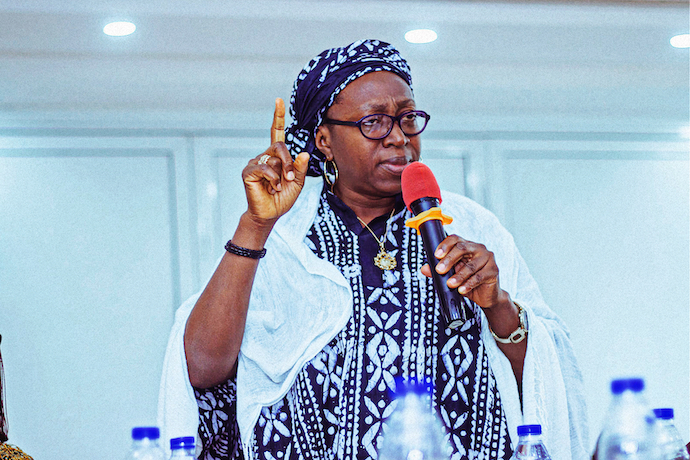The Platform
Latest Articles
by Wonderful Adegoke
by Abdul Mussawer Safi
by Mohammad Ibrahim Fheili
by James Carlini
by Mohammad Ibrahim Fheili
by Abidemi Alade
by Sheiknor Qassim
by Theo Casablanca
by Vince Hooper
by Wonderful Adegoke
by Abdul Mussawer Safi
by Mohammad Ibrahim Fheili
by James Carlini
by Mohammad Ibrahim Fheili
by Abidemi Alade
by Sheiknor Qassim
by Theo Casablanca
by Vince Hooper
How a Nigerian Nonprofit is Trying to End Female Genital Mutilation
In 2016, based on her own experience of being circumcised, Lola Ibrahim, along with four other women, founded the WAVE Foundation.
LEKKI, Nigeria – In 2019, Lola Ibrahim approached her mother in an apprehensive mood seeking to understand why she had undergone female genital mutilation as a child. Her mother explained that it was done “out of love” on the orders of her grandmother. While an undergraduate student in the 1990s, a documentary on the practice brought back fresh memories of when she had been circumcised as a child.
“I had never imagined that a part of my genital organs had been cut. I assumed that every girl or woman was like me, so I kept watching the story. Suddenly, I felt empty and rigid as if a part of my body was incomplete,” Lola Ibrahim explained to me in an interview.
She continued to explain that her mother had consoled her by saying that girls who were not cut were regarded as “lakiriboto,” a Yoruba-tribal term meaning girls without a private part, and are seen as unclean and promiscuous.
“My mother told me that I would have been unattractive to potential husbands if I wasn’t cut, adding that she allowed me to be cut out of love although it was in deference to her mother-in-law as the cut is seen as a symbol of grace. This tradition tortured my body, violated my rights, and affected my mental [health]. I don’t see it as love at all because I will never get back what was taken from me,” Lola noted with a distant uneasiness.

UNICEF defines female genital mutilation as “all procedures involving partial or total removal of the female external genitalia or other injury to the female genital organs for non-medical reasons. It is most often carried out on young girls between infancy and age 15. In every form in which it is practiced, [female genital mutilation] is a violation of girls’ and women’s fundamental human rights, including their rights to health, security, and dignity.”
Experts lament that circumcisions, which are usually done using unsterilized blades or small knives, are harmful because they might lead to complicated issues such as child mortality, infertility, severe hemorrhaging, and tearing of tissue during childbirth among other complications.
According to a survey from the World Health Organisation, 125 million girls and women are living with the effects of female genital mutilation throughout the world. 80% of these cases occur in Africa and about 20 million girls between the ages of 15 and 49 in Nigeria suffer from it. While identifying rising poverty, conflict, climate change, and other inequalities as factors responsible for such high rates, the United Nations predicts that the figure could rise to 4.6 million globally by 2030 if critical measures are not put in place.
In May 2015, there was a significant development in the fight against female genital mutilation in Nigeria when former President Goodluck Jonathan announced his support for a bill to ban the practice altogether. This announcement marked a significant milestone in the efforts to address the barbaric practice in Nigeria. The bill eventually led to the Violence Against Persons Prohibition (VAPP) Act 2015. Countless Nigerians had hoped that this cultural practice would become a thing of the past. However, nearly a decade later, the practice persists.
“When we decide that cutting the clitoris would stop women from being promiscuous, the die was cast for as long as we have that parochial mindset, the defaulters will continue their business. If persons are prosecuted for the crime, perpetrators will not only see but hear and desist from it,” said Elizabeth Iyamu-Ojo, a lecturer at the Department of Public Law at the University of Benin, Edo State.
Although the legislation proscribes a four-year prison sentence, no one has been prosecuted for performing the procedure. “A man who marries a circumcised wife is complaining that his wife is unresponsive or uninterested in bed but why will she be when society has killed that part of her? An initiative advocating against [female genital mutilation] would help to [educate] people more on the issue,” Iyamu-ojo told me.

Despite legislation outlawing the practice, according to data, the practice is still performed at an alarming rate.
Given her own personal experience, Lola Ibrahim, along with four other women, founded the WAVE Foundation in August 2016. The WAVE Foundation, or the Women Against Violence & Exploitation Foundation, is a registered non-profit organization that is committed to building strategic partnerships to end female genital mutilation in Nigeria. The foundation ensures the mental well-being of these victims by connecting them with psychologists and psychotherapists who work to see that they are able to confront their physical and emotional scars.
WAVE employs “experience validation and cognitive behavioral therapy to help [survivors] revisit the ordeal and recreate an empowering memory of the aftermath then matrix reimprinting techniques” are used.
WAVE organizes campaigns where they educate rural Nigerians on the dangers of female genital mutilation and give them ample reasons to stop the practice. To drive home the point, Lola told me that she usually shares her own story of the trauma she experienced.
“Girls who have gone through [female genital mutilation] lose their self-esteem and have resentment towards their parents/caregivers,” Dooyum Mchiaga-Tsavsar, a trauma care specialist, told me.
Since its inception, WAVE has been able to help and support thousands of women and girls who have been impacted by the practice. WAVE claims that it is the first organization to organize a walk to end the practice in Nigeria. To sustain its approach, WAVE uses donation-based crowdfunding to source funds.
Stressing that ignorance remains the major obstacle to ending female genital mutilation, Dooyum said that people see the practice as a cultural necessity.
“Most parents we’ve spoken to argue that they did it to curb the girls’ sexual pleasure in order to avoid promiscuity. This cultural belief keeps it going. Since it has cultural support, we can only minimize it with an approach like ours but to erase it totally will be hard work and this means it is a long-run fight.”
Limited capacity poses a problem for WAVE. “For a non-profit like ours, it might have a limited capacity to manage growth especially as we’re operating with a lean staff and small resources. Adequate financial resources would enhance our development of new capabilities and capacities, expanding our reach often requires significant funding, else it would be difficult to invest in infrastructure and resources needed for growth,” Lola Ibrahim explained.
Editor’s note: An earlier version of this story misidentified female genital mutilation as female gender mutilation. Our apologies to Lola Ibrahim and anyone else who was offended.
Mohammed Taoheed is a freelance journalist based in northwest Nigeria where he studies Law at the Usmanu Danfodiyyo University, Sokoto State. Taoheed is interested in development, conflict, politics, and social justice.